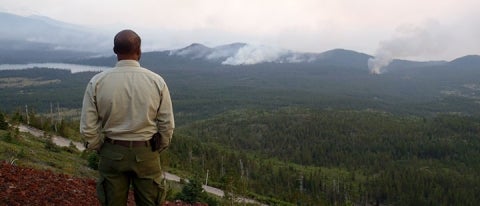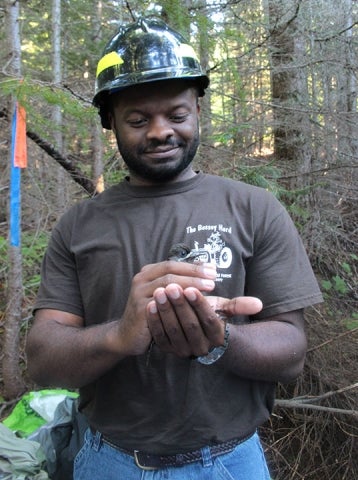Note: Yale School of the Environment (YSE) was formerly known as the Yale School of Forestry & Environmental Studies (F&ES). News articles and events posted prior to July 1, 2020 refer to the School's name at that time.

You might say Terry Baker ’07 M.F. learned his first important lesson about working for the federal government during his earliest moments on the job.
Baker had just graduated from high school when he showed up for the first day of a summer internship at Apalachicola National Forest, not far from his home in Florida’s panhandle. But his boss, it turned out, wasn’t expecting him for two weeks.
“So the boss gave me a copy of the newly printed Forest Plan,” Baker recalled recently. “If you haven’t seen a Forest Plan, it’s a large, cumbersome document with a lot of references to other documents. But he told me, ‘Until I figure out what we’re going to do with you, read this.’”
And so he did. Over the next two weeks Baker poured through the plan, absorbing critical lessons about forest management and learning the lexicon of the U.S. Forest Service — including a litany of federal acronyms.
“As painful as it seemed at the time, it taught me a lot,” he says. “And I retained quite a bit of it. So much so that they used me as a sort of walking reference those first couple of summers. They’d say, ‘Oh, Terry, where does it say this in the Forest Plan? I know it’s in there somewhere.’”
During those early summer internships, Baker became more than the go-to expert on the Forest Plan. He learned first-hand how the Forest Service works — and about the people who make it run — working with timber marking crews and wildlife biologists, covering the forest’s front desk and providing support during fires.
In the years since, Baker has spent his entire professional career with the Forest Service, reaching the level of forest ranger by the time he was 30. And he says he’s still learning lessons that go far beyond anything you can find in a book. And it all comes back to working with people, he says.

When he arrived at F&ES, not long after receiving a bachelor’s degree from the University of Florida, Baker already had significant forestry experience. But he came to New Haven to bolster his understanding of global environmental issues — and to develop his leadership skills.
While working toward his Master of Forestry (M.F.) degree, he volunteered with several student groups and worked with the school’s Admissions office, where he coordinated analyses for admissions strategies, participated in recruiting trips, and met with prospective students and potential donors. “Learning how to navigate a university’s administration,” he says, “is on par with learning how to navigate a federal agency’s administration.”
Indeed, soon after graduating from F&ES in 2007, Baker returned to the Forest Service as a fulltime employee, landing a job on the ranger’s staff at Rogue River Siskiyou National Forest in Oregon. Within a few months, his boss resigned. So Baker and a colleague assumed his duties, which included coordinating budgets, supervising programs, and managing $10 million in American Recovery and Reinvestment Act funds.
Alumni on Campus
Terry Baker will discuss his career and leadership as part of the Alumni Association Speaker Series at 4 p.m. April 10 in Bowers Auditorium. The theme of his talk will be “Leadership: The Challenge of Being Yourself.”
“Around this time, a person came up to me at a conference and said, ‘Well if you’re doing all these things you should probably look at being a ranger somewhere,’” Baker recalls. “That really caught me off guard.”
But within a year he was hired to lead a small office with the Nebraska National Forest and Grassland. While in Nebraska, Baker developed a newfound expertise in cattle issues and historic preservation regulations since the forest hosted agency’s oldest nursery. More important, he nurtured important skills working with the people in the community.
When the Forest Service was forced to demolish a swimming pool that had been a community staple for generations, he explained to people why it had to be done. And he learned the importance of maintaining professionalism in a small community.
“You have a lot of responsibilities that you’d expect, and a lot of responsibilities that you wouldn’t expect,” he says. “When you’re in a place that’s that small and that rural, no matter where you go you’re the district ranger. You make decisions that affect an employees’ life, or a permittee’s life, or a contractor’s life. You always have to be on.
“So I really made the effort to work with the community and be present.”
By 2011, Baker returned to Oregon, where he was appointed District Ranger for the McKenzie River Ranger District, an area of the central Cascades known for its exceptional natural beauty, located in the Willamette National Forest.
Back in Oregon, he faced the kinds of challenges you don’t learn about in school. For example, there was the 10,000-acre forest fire that greeted him during his first month. Soon after, there was the pregnant woman who entered his district office experiencing labor pains. And there always the the occasional issues associated with the forest’s clothing-optional hot springs.
And throughout his tenure has been the fallout from a proposed forest thinning project, developed to reduce the threat of wildfire, which has inspired passionate opposition from some residents. While the plan was actually created before he arrived, Baker and his staff have been subjected to criticism that has been, at times, personal and hurtful.
His response, however, has been to remain accessible to the public, explaining the goals of the project with openness and respect. But he also made clear to members of the public that he expects the same from them.
He established a tone of respect that helped earn him “man of the year” honors from the McKenzie River Valley’s River Reflections newspaper earlier this year. “Terry is unique — he values people with words and actions,” one reader wrote.
Baker says he very consciously tries to present an honest face for the U.S. Forest Service. During one public meeting, he recalls, Baker stood at the front of a community center, dressed in his Forest Service uniform, to explain the thinning project to a restless crowd. He explained the rationale behind the project, and assured them that there would be ongoing, and public, monitoring.
Then he asked members of his own staff, scattered around the room in civilian clothes, to stand up.
“I told the crowd, ‘I want you to look at these people,’” Baker recalled. “I said, ‘There’s a reason they’re not in uniform — because I want you to recognize that they are your neighbors, your kids’ basketball and baseball coaches, the people you see at church... They represent this community just like you do, and they’re not going to do anything to intentionally hurt this community. So please speak to them civilly. And if you don’t, we’ll leave.’
“Some of the people who said the most during the open forum left — they just walked out of the building,” Baker says. “But the rest of the community stayed and asked questions. They had them answered. And we moved forward.”

